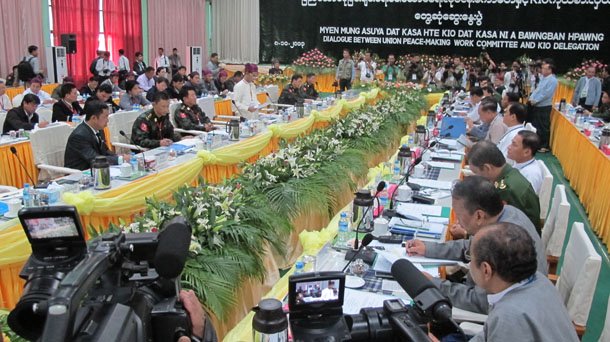CHIANG MAI, Thailand — Civil society organizations raised concerns on Wednesday over Burma’s ongoing peace process amid a growing chorus of ethnic minority voices clamoring for US President Barack Obama to address the issue during his visit to the country this week.
At a public forum at Chiang Mai University in northern Thailand, ethnic Shan, Kachin and Karen rights groups accused the Burmese government of exploiting its ceasefires with rebel armed groups by militarizing ethnic minority territories in order to secure resource-rich lands and bolster security around commercial interests.
Paul Sein Twa, director of the Karen Environmental and Social Action Network (KESAN), said ceasefires with Burma’s ethnic Karen armed groups had thus far proven to be opportunities for the Burma Army to safely deploy more troops in Karen State. The aim has been to protect business projects, he said, pointing in particular to the Hat Gyi dam, a hydropower venture that is planned on the Salween River in Karen State.
“Ceasefire means militarization. We want ceasefire to mean demilitarization,” said Paul Sein Twa, who added that militarization would also open the door to future foreign investment in ethnic territories.
The military has a track record of occupying territory and bases previously held by ethnic rebels after launching attacks against ethnic minorities, he said, with the militarization leading to human rights abuses against local civilian populations.
“We call for a complete end to civil war and militarization. Civilians are not safe from militarization. It is important that Obama address security issues [when meeting with Burmese government officials] for the sake of civilians,” said Paul Sein Twa.
Obama arrived in Naypyidaw on Wednesday to attend the Asean and East Asia summits, and is also set to meet with President Thein Sein, several regional heads of state and opposition leader Aung San Suu Kyi.
Paul Sein Twa said recent renewed fighting between the Karen rebel group known as the Democratic Karen Benevolent Army (DKBA) and government troops had forced more than 2,000 civilians from their homes, many of whom are still hiding in the jungle or on the Thai-Burma border.
“They [civilians] even fear that the conflict might reignite after Obama’s trip to Burma, so they dare not return home,” said Paul Sein Twa.
Although the government has reached ceasefire agreements with more than a dozen ethnic armed groups and aims to have a nationwide ceasefire accord signed, fighting continues to flare up. Clashes between the Burma Army and a handful of rebel groups has been reported in Kachin, Shan, Karen and Mon states this year alone.
Nang Kwarn Lake, spokesperson for the Shan Human Rights Foundation, agreed that commercial interests were motivating the Burma Army’s behavior, which he said belied the central government’s ostensible peace overtures.
“Ongoing militarization is linked to trade as the government wants to control natural resource-rich territories in ethnic areas,” she said.
“The government is not sincere in the current peace process. If the government is really sincere about the peace process, they should pull back their troops in ethnic areas,” she added.
Meanwhile, ethnic Kachin civil society groups earlier this week called on the US government to play a greater role in conflict resolution and post-conflict solutions in Burma.
In a letter addressed to Obama, a group of 28 civil society organizations from Burma and abroad urged his administration to “consider” several points during his second visit to the country.
Tuesday’s letter asked the Obama administration to urge the Burmese government to redraft a controversial Constitution written by the military in 2008. It also requested that the United States take an actively participatory role in Burma’s peace process and ensure that international actors proceed sensitively with both aid and resettlement activities related to civilians displaced by conflict.
“We think that redrafting the Constitution is the best way to bring about change, instead of making changes bit-by-bit,” said Khon Ja, a renowned activist and director of Kachin Peace Network, one of the letter’s signatory groups.
Once that hurdle is cleared, she said, it will enable the implementation of a federalist system, the core demand of many of Burma’s insurgencies. Khon Ja said that KPN would like to see the United States participate in future peace negotiations and witness the signing of a nationwide ceasefire agreement.
The letter also pushed for “unconditional support” from the international community for local aid efforts involved in supplying and resettling internally displaced persons (IDPs).
According to UN estimates, more than 100,000 civilians have been displaced in Kachin and northern Shan states since a 17-year ceasefire broke down between the government and Kachin rebels in 2011. The Kachin organizations estimated that there are an additional 20,000 IDPs who remain unrecognized by the UN. Many of the displaced are still living in remote camps where they have often been denied access to aid.
Khon Ja urged Obama and his administration to broaden the scope of their engagement with Burma from political to humanitarian interests.
Obama’s second visit to Burma comes amid claims that the country’s reform process, which began in 2011 with the installation of a nominally civilian government, has stalled. Efforts to end decades of civil war and to ensure free and fair elections have roundly disappointed international observers, while analysts have also said Burma is backsliding on press freedom.
In an open letter to Obama on Nov. 3, an alliance of 11 ethnic armed groups known as the United Nationalities Federal Council (UNFC) said that on-and-off fighting between ethnic armed groups and the government army in Kachin and northern Shan State, as well as recent renewed fighting in eastern Burma’s Karen State, were contributing to delays in signing a nationwide ceasefire agreement.

















